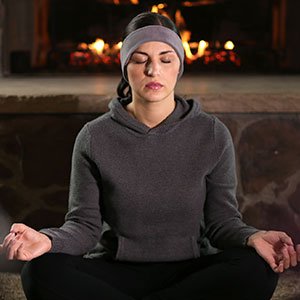How to Deal With Sleep Anxiety

Sleep is a natural act. But that doesn't mean it comes naturally to everyone.
People who suffer from sleep anxiety struggle to get the rest they need and want. As much as they try to fall asleep, racing thoughts keep them awake. Over time, they can come to dread bedtime and to develop anxiety around the act of falling asleep.
Research shows that anxiety disorders lead to poor sleep quality. Meanwhile, sleep deprivation can trigger anxiety.
Sleep anxiety is more common than you think, with more than 50 percent of American adults reporting that anxiety affects their ability to fall asleep. Nighttime anxiety is common because an entire day's worth of stress finally has an opportunity to set in. In addition to thoughts of the past, you may also be anticipating what could lay in store the next day.
This may sound like a no-win situation, but there are ways to combat anxiety at night. Of course, your first stop should always be to your doctor to rule out any underlying issues like a panic disorder. Once you do that, try these tips to keep anxiety before bed at bay.
-
Avoid stressful activities before bed.
The hours before bed are not the time to watch the news, answer work emails, or pay bills.
-
Power down electronic devices.
The light from your devices tricks your brain into thinking it's still daytime— plus the news, text messages, and emails can fuel anxiety before bed.
-
Keep a pen and paper handy.
Use them to jot down any worries or to-dos that can be left for the next day.
-
Create a calming bedtime routine.
Activities like light reading, listening to soothing music, and stretching can help cue your body that it's time for bed.
-
Create a restful environment.
Your room should be cool, dark, and quiet, so adjust the temperature, invest in darkening curtains, and consider using a white noise machine or earplugs.
-
Try meditating.
Meditation quiets a busy mind. Today, there are many apps that can help guide your practice.
-
No clock in the room.
Don't keep a clock in your bedroom or cover the clock at night so you can't peak at what time it is when you can't fall asleep.
-
Use lavender.
Studies show the scent of lavender to be calming.
-
Try sleep restriction therapy.
It's a natural remedy for insomnia that works like reverse psychology.
-
Look into sleep promoting products.
Many people find sleep accessories like ear plugs, eye masks, and aromatherapy help them drift off to sleep. A newer trend that many people like is weighted blankets for anxiety and insomnia.
Another product that can help quell anxiety at night are SleepPhones® headphones. As the world's most comfortable headphones for sleeping, SleepPhones® headphones feature flat speakers in a soft, stretchy headband. SleepPhones® headphones let you comfortably listen to music, audiobooks, podcasts, nature sounds, and more while in bed, even if you're a side sleeper. Shop our favorite models below!
Learn more about managing anxiety at our "Anxiety Resource with Tips for Anxiety Relief" page.
Find more about managing sleeplessness at our "Insomnia" resource page.
